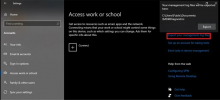ThumperTM
Windows Ninja
- Joined
- Aug 18, 2010
- Messages
- 13,892

Unofficial patches have been issued to remediate an improperly patched Windows security vulnerability that could allow information disclosure and local privilege escalation (LPE) on vulnerable systems.
Tracked as CVE-2021-24084 (CVSS score: 5.5), the flaw concerns an information disclosure vulnerability in the Windows Mobile Device Management component that could enable an attacker to gain unauthorized file system access and read arbitrary files.
Security researcher Abdelhamid Naceri was credited with discovering and reporting the bug in October 2020, prompting Microsoft to address the issue as part of its February 2021 Patch Tuesday updates.
But as observed by Naceri in June 2021, not only could the patch be bypassed to achieve the same objective, the researcher this month found that the incompletely patched vulnerability could also be exploited to gain administrator privileges and run malicious code on Windows 10 machines running the latest security updates.

"Namely, as HiveNightmare/SeriousSAM has taught us, an arbitrary file disclosure can be upgraded to local privilege escalation if you know which files to take and what to do with them," 0patch co-found Mitja Kolsek said in a post last week.
However, it's worth noting that the vulnerability can be exploited to accomplish privilege escalation only under specific circumstances, namely when the system protection feature is enabled on C: Drive and at least one local administrator account is set up on the computer.
Neither Windows Servers nor systems running Windows 11 are affected by the vulnerability, but the following Windows 10 versions are impacted —
- Windows 10 v21H1 (32 & 64 bit) updated with November 2021 Updates
- Windows 10 v20H2 (32 & 64 bit) updated with November 2021 Updates
- Windows 10 v2004 (32 & 64 bit) updated with November 2021 Updates
- Windows 10 v1909 (32 & 64 bit) updated with November 2021 Updates
- Windows 10 v1903 (32 & 64 bit) updated with November 2021 Updates
- Windows 10 v1809 (32 & 64 bit) updated with May 2021 Updates
Then last week, Naceri disclosed details of another zero-day flaw in the Microsoft Windows Installer service (CVE-2021-41379) that could be bypassed to achieve elevated privileges on devices running the latest Windows versions, including Windows 10, Windows 11, and Windows Server 2022.
Source: TheHackerNews